Thursday Comics Hangover: For mature readers
Aside from Charles Schulz's Peanuts, American comics aren't great at melancholy. I've read plenty of depressing comics, and many upbeat comics, but the gentle downward slope of melancholy seems too subtle for most American cartoonists to capture.
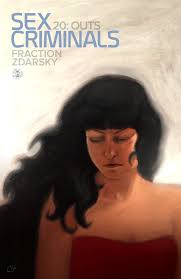
The 20th issue of Chip Zdarsky and Matt Fraction's series Sex Criminals is about a breakup. Neither party seems to want to break up, but they both understand that they have to do it. They have sex, even though they know they shouldn't. They have trouble articulating the things they know they need to say. They are uncomfortable in the moment, and they both know it.
Meanwhile, in another scene, a middle-aged man and woman have sex. She's a retired sex worker. He's an academic. His reaction to her past is getting in the way. She's seen this before. She's tired of it, but she explains it to him anyway.
Sex Criminals has always been a special comic. It's based on a one-note gimmick of a plot — a man and a woman find that they can stop time with their orgasms, so they go on a fuck-fueled bank-robbery spree — but it has somehow expanded to incorporate a rainbow of sexual interests, personalities, and questions about what it means to be human. It's explored adult romantic relationships with a subtlety that most modern literary novels can't touch. The depiction of depression in an early issue felt truer and more honest than most memoir. For those reasons and more, the series continues to be a miracle of the American comics industry.
But issue number 20 is something else again. It has the feel of a deep-autumn Charlie Brown strip (albeit one with explicit illustrations of adult genitalia) and it perfectly captures the responsibility and difficulty of adult life. New readers will be entirely lost — hell, I can't keep track of who all these characters are, and I've been following the book since the beginning — but those who have read the whole thing will find a remarkable maturation in the book's already-mature themes. If Sex Criminals keeps up like this — and if it, uh, climaxes in a, uh, satisfying way — it could be one of the all-time great serialized comics.
Evicted is such a good book it rendered me effectively speechless
I couldn't talk about Matthew Desmond's book Evicted: Poverty and Profit in the American City during last night's edition of the Reading Through It book club at Third Place Books Seward Park. Every time I tried to talk, I fumbled over my words, or said something that meant the exact opposite of what I was trying to say. This happens a fair amount when it comes time to talk about housing. Urban housing is such an important topic at the center of a giant Venn diagram of issues — homelessness, addiction, poverty, race — that I don't know where to begin.
Thankfully, everyone else in the group stepped up, and no thanks to me, we had a great hourlong conversation about the book. Evicted is a brilliant piece of reportage. Desmond tells a compelling story about people trying to obtain shelter in Milwaukee, and the narrative is so lively, so immediate, that you barely realize you're learning important facts about the housing crisis as you read about Evicted's protagonists. It's no wonder that the book won the Pulitzer Prize; Desmond's journalism is beyond reproach.
Aside from the refreshing lack of Donald Trump talk, I most enjoyed how the conversation about Evicted was rooted in local current events. We discussed Seattle's checkered history with low-income housing and the city's inadequate response to homelessness and rent spikes. Most of us agreed that the answer was not to simply stick ugly low-income housing off in a corner of the city, but to incorporate housing into all parts of Seattle, to create a city where poor and rich live side-by-side, so they can better understand each other.
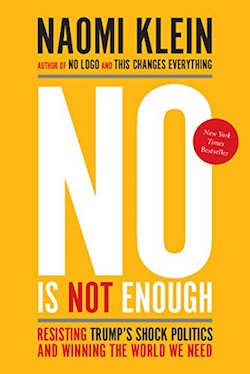
But Evicted also inspired conversation about how much work it is to be poor, about why America demonizes the poor, about the predatory systems that exist to take advantage of poor Americans, draining them of every last cent. It's a book that couldn't be more appropriate for this moment if it was published yesterday, and while most of us found the book to be more than a little depressing, we all agreed that it was exquisitely written.
Next month, the Reading Through It book club meets at Third Place Books Seward Park to discuss Naomi Klein's No Is Not Enough: Resisting Trump's Shock Politics and Winning the World We Need, a guide to stop resisting and start creating an alternative. Join us on Wednesday, September 6th. From now until then, the book is 20% off at Third Place.
Your Week in Readings: The best literary events from August 2nd - August 8th
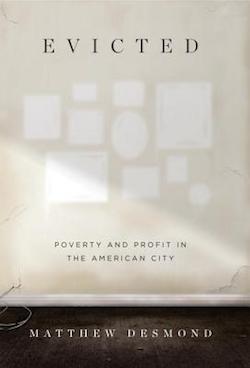
Wednesday August 2nd: Reading Through It: Evicted
Join the Seattle Review of Books and the Seattle Weekly in the latest of our monthly book discussion series. This month’s book, the Pulitzer Prizewinning Evicted: Poverty and Profit in the American City, is the first selection that could possibly evoke absolutely no discussion of President Trump. Come talk about why the rent is so damn high with us! Third Place Books Seward Park, 5041 Wilson Ave S, 474-2200, http://thirdplacebooks.com. Free. All ages. 7 p.m
Thursday August 3rd: X Y Z Gallery Opening
See our Event of the Week column for more details. X Y Z Gallery, 300 S Washington St, http://www.mount-analogue.com/ . Free. All ages. 6 p.m.Friday August 4th: Science Fiction Songwriting for Teens
This is exactly why we have a public library system: real recording artists will work with Seattle-area teens (that’s age 13 and up) to write and record songs about the sci-fi story of their choice. If you record a sea shanty about Battlefield Earth, please email it to me, okay? Seattle Public Library, Southwest Branch, 9010 35th Ave SW, http://spl.org. Free, registration required. All ages. 2:30 p.m.Saturday, August 5th: Noir at the Bar: Los Angeles vs. Seattle
The mystery-themed reading series at Seattle’s swankiest bar continues with a very special episode. Los Angeles writers including Sarah M. Chen, Ashley Erwin, Danny Gardner, and more will do literary battle with Seattle mystery writers including Kat Richardson, Tracy Weber, and Nick Feldman. The home team had better win this one. Sorrento Hotel, 900 Madison St., 622-6400, http://hotelsorrento.com. Free. 21 and over. 7:30 p.m.Sunday August 6th: Comics Dungeon Sale
Wallingford’s Comics Dungeon recently founded a nonprofit named Comics for Community, Compassion, and Culture, which teaches literacy through comics to kids. That means that if you visit Comics Dungeons’ anniversary sale and buy some $1 comics or discounted trade paperbacks, you won’t just be participating in crass commercialism — you’ll also be helping to teach local kids to read. Comics Dungeon, 319 NE 45th St., 545-8373. http://comicsdungeon.com. Free. All ages. 11 a.m.Monday August 7th: Seattle Mystery Authors Tell All
Join local mystery authors Glen Erik Hamilton, Robert Dugoni, Tracy Weber, and Jim Ziskin as they get together to discuss the pleasures and perils of being a mystery author. This evening is scheduled as a group discussion which will then segue into a conversation with the audience — perfect for aspiring authors to get some candid tips. University Book Store, 4326 University Way N.E., 634-3400, http://www2.bookstore.washington.edu/. Free. All ages. 7 p.m.Tuesday August 8th: Three Poets Reading
Melissa Dickey writes weird and wonderful poems about miniature children and accidents. Andy Stallings wrote an amazing poem about the curvature of the Earth titled “Geometry.” Jay Thompson has written poems about Dungeons & Dragons. Together, the three will either read poems or combine their bodies to form a larger Voltron-type figure, or both. Open Books, 2414 N. 45th St., 633-0811, http://openpoetrybooks.com. Free. All ages. 7 p.m.Book News Roundup: Grab a milkshake and listen to some audio books
The good folks at Seattle independent online audio-bookseller Libro.fm have collected audio clips of their summer picks. If you're looking to sample a book or two before you head out on vacation, you should give this post a try.
A special message from Jeff Bezos (via The Onion):
As you might imagine, I often get asked by young entrepreneurs for advice on how to start a business. What many seem to want is some sort of trick, some magic set of tools that will allow them to launch a thriving startup from scratch. Well, there’s no magic involved, but the keys to success are quite simple: Value your customers, hire well, find a market that isn’t being served, and realize that someday I will utterly crush you.
- A 68-year-old writer is suing the Iowa Writers' Workshop for age discrimination. The L.A. Times's Jacket Copy blog smartly published the first paragraph of the writer's self-published novel so the audience could decide for itself whether he deserved to be accepted or not. Here's the first half of the paragraph:
The name of Norman Telos’ car was an automatic talk show joke. The Tork rhymed with stork, pork and cork. When the talking heads were done making fun of the Tork they went out and bought one because the Tork was the best two passenger sedan since the model T. Its diesel electric engine was the most efficient one on the market. Acceleration was better than any sports car. With 2 crossing roll beams and a domed roof it was the safest car around. The price was in the midrange of two passenger cars.
Sometimes a high sense of self-regard can be its own downfall, is all I'm saying.
An editor at Marvel Comics posted an innocuous selfie of a post-work milkshake party. That editor then received a deluge of hateful comments from comics-fan trolls. What did the editor do wrong? Well, uh, she's a woman.
She was immediately swarmed by a squadron of fanbabies furious that such “fake geek girls” had made their way into Marvel’s inner sanctum... According to Antos, the private messages she got in response to her tweet were considerably less polite. “[T]he internet is an awful, horrible, and disgusting place,” she wrote, noting that she woke up Sunday, two days after she posted the selfie, "to a slew of more garbage tweets and DMs. For being a woman. In comics. Who posted a selfie of her friends getting milkshakes."
- Jesus Christ, white-dude comics fans. Get a hold of yourselves. Thankfully, other comics pros are standing up to the trolls with the hashtag #MakeMineMilkshake:
Cheers @Marvel ladies! #MakeMineMilkshake pic.twitter.com/3Xky93iFSN
— DC (@DCComics) August 1, 2017
- The inevitable Listicle of Michiko Kakutani's Best Burns has arrived, and it's pretty entertaining.
Literary Event of the Week: X Y Z Gallery opening
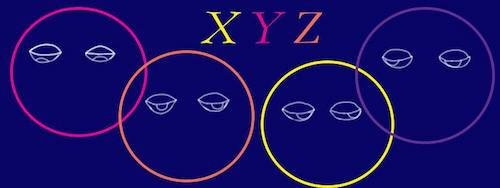
Colleen Louise Barry, the publisher at Seattle small press Mount Analogue, told me back in April that she dreamed of opening up a space somewhere in the city, a venue as nontraditional and artistic as the titles Mount Analogue publishes. She was reticent to discuss the idea — it seemed too crazy, in a city with booming real estate prices, to imagine — but eventually I coaxed it out of her. She talked about a performance space, a gallery, a small bookshop, and a space that functions as a never-ending salon, “a place where everything can coincide and collide into each other.”
It was hard to prize the idea away from all the caveats that Barry piled around it: such a place could never work. Nobody’s really done anything like that before. Artists can’t afford to live in Seattle anymore, let alone open businesses. Maybe one day after the economy collapses it’ll be a viable idea again.
What a difference 120 days makes: This Thursday as part of Pioneer Square’s First Thursday Artwalk, Barry will be co-presenting the grand opening party for X Y Z Gallery, a “collective arts space” that houses four different arts organizations. Alongside Specialist, a contemporary art gallery, you’ll find the headquarters for three young small presses.
Mount Analogue, of course, is one of the publishers in X Y Z. Barry is single-handedly blurring the line between visual art, performance art, and the literary arts. Her books are bizarre and beautiful objects which tend to find poetry in odd places. (My favorite Mount Analogue title so far is Final Rose, a book-length poem by Hailie Theoharides composed entirely out of subtitled screenshots from The Bachelor.) In her space, Barry will present an installation by Mary Anne Carter titled “Women in the Style of Taco Bell” alongside special performances.
Nearby, you’ll find the headquarters for Gramma Poetry, an ambitious young poetry press that has already become one of the most vital publishers in town. Gramma published Sarah Galvin’s latest (and, so far, greatest) poetry collection Ugly Time, and they most recently published Anastacia-Renée’s (v.). They’ll be presenting a collection of art that has served as book covers for Gramma’s releases.
Last, and probably least-known, of the three is local risograph printer Cold Cube Press. Cold Cube is a publisher and for-hire press that is remaking the aesthetic of what we expect books to be. You can identify a Cold Cube book from twenty paces: their risograph printing process isn’t as harsh as the gaudy processes used by most modern publishers. Each book feels hand-processed: if your typical John Grisham paperback is the publishing equivalent of factory farming, Cold Cube books are free-range and organic. They’ll be showing off their new printing studios throughout the evening.
The opening of X Y Z Gallery is a big moment for the Seattle literary scene. It represents three independent presses joining forces and carving a space in the world for themselves. By making a space for artists and lovers of the literary arts, this could represent the dawning of a new Seattle aesthetic: something young and warm and handmade and beautiful. You’ll want to get in on this.
Anyone want to buy a bookstore? Seattle Mystery Bookshop is for sale.
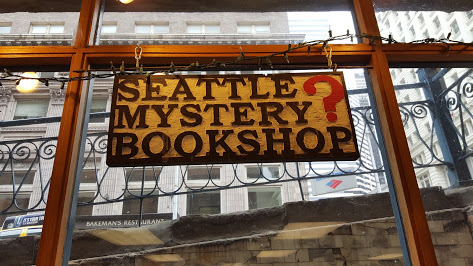
Seattle Mystery Bookshop, the mystery-centric bookstore that has held down a storefront on Cherry Street in Pioneer Square for decades, is for sale as of today. You may recall that Seattle Mystery Bookshop ran a GoFundMe in January of last year. In a note on the store's blog, owner J.B. Dickey says that successful fundraiser "bought us a year – but barely, and that has taken its toll." He says another fundraiser would continue an unsustainable business model.
I visited the store this afternoon and talked with booksellers Fran and Amber about the news. (Dickey was out of town but is due to return tomorrow.) They confirmed that if it doesn't find a buyer, the store will at least be open through the end of August and early September. "Judy [J.A.] Jance is scheduled for a reading in September, and we're not going to miss that," Fran told me.
Why is the store on the market? The booksellers confirm to me that sales are down, but they believe it's because Pioneer Square foot traffic, in general, is on the decline. Without Elliott Bay Book Company to anchor the satellite bookstores, bookish tourists don't visit Pioneer Square anymore. Additionally, the city has failed to support the neighborhood, and the uncertainty surrounding the soon-to-be-demolished Alaskan Way Viaduct looms over local businesses.
Fran and Amber both firmly believe the bookstore would be successful if it moved to a more active, vibrant neighborhood with foot traffic — somewhere like Queen Anne or Fremont. An enthusiastic young owner who loves books would likely do very well by combining the store with a cafe and creating a Seattle Mystery Bookshop for Seattle as it is now — something like a crime-minded version of Ada's Technical Books.
Interested buyers, if they purchase the store, would receive the store's stock, access to a staff with more than a half-century collective bookselling experience, and the goodwill of a tight-knit community of loyal mystery authors. The shop has hosted hundreds, if not thousands, of mystery authors over the years, and some of them travel to Seattle Mystery Bookshop on their own dime to launch their latest books into the world.
You should let prospective buyers know about this incredible deal. And in the meantime, Seattle Mystery Bookshop is throwing a sale for the rest of the month. Visit their site for more details, and stop by to show your support.
PEN America's digital archive is now available online. It's a free and fully searchable guide to recordings of some of the biggest writers in the world from 1960 to today. Some highlights:
Haruki Murakami's "first speaking engagement ever," from way back in 1991.
A 1986 group reading with Margaret Atwood, Alice Munro, Harold Brodkey, Robertson Davies, and Cynthia Ozick.
Buckminster Fuller and Pablo Neruda contributing to a conversation about "The Writer in the Electronic Age."
Diane Ackerman, Barry Lopez, and David Quammen discussing a writer's connection to place.
Feel free to search the archives for your own favorites, and let us know what you find.
We're giving away free tickets to the Glass Castle screening. Here's how to win:
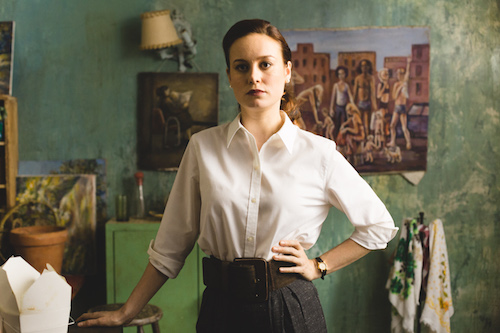
Independent booksellers and librarians made Jeannette Walls's 2005 coming-of-age memoir The Glass Castle into a global bestseller. While Castle was obviously well-written and funny and heartbreaking, it's hard to imagine the book breaking through into the mainstream without the passionate support of librarians and booksellers who understood the value of a meaningful coming-of-age story.
The film adaptation of Glass Castle (starring Brie Larson, Woody Harrelson, and Naomi Watts) is coming out on Friday, August 11th, and because the literary community made the book such a huge success, the good folks at film PR firm Allied Integrated Marketing wanted to make sure that bookish folks got to see it first. So we're partnering with them to give away some free VIP ticket prize packs to the Seattle premiere of Glass Castle, which screens next Tuesday evening at Pacific Place.
All you have to do to enter is visit our Twitter feed or our Facebook page and follow the directions there. If you retweet the Glass Castle tweet or comment on the Glass Castle Facebook post by 5 p.m. today (August 1st), you're entered to win. That's it! We'll notify the winners by tomorrow evening.
Disbelief
Said the prayer to the dream
I don't believe you want to hear meSaid the dream to paper
I don't believe you want to hold meSaid the paper to the wind
I don't believe you want to help meSaid the wind to the man
I don't believe you see meThe man felt the wind whisper in his ear and swatted the dream
that sounded like a prayer that was held by the paperIn one breath, the wind became an answer
no one ever asked the question toIn one dream, the wind forgot its voice, in another dream the paper
was torn before it learned how to say its own nameIn the first dream, the prayer learned what walking through
blackness feels like — it is the opposite of abandonmentIn the last dream, all the names are written on the paper
in the form of a prayer that sounds
like the wind and feels like the breath
of a flower across your cheek
Anastacia-Renee is Seattle's next Civic Poet
Great news! Seattle's next Civic Poet will be Anastacia-Renée, who until recently was the poet-in-residence at the Hugo House. Appropriately, I just wrote about Anastacia-Renee's ubiquitousness a couple weeks ago, and I wrote about the importance of the Civic Poet program last week. It's like it was meant to be.
From the city's announcement:
“When poetry takes center stage, tension filled spaces become safe literary hubs where community members can gather to share and celebrate the plethora of local, historical, and contemporary voices,” says Anastacia-Reneé. “I’m excited to forge creative new literary paths that lay beyond the standard expectations of poetry.”
Hopefully, we'll be talking with Anastacia-Renée in the next couple of weeks about her plans for the new gig. She has quite a legacy to live up to; the first Civic Poet, Claudia Castro Luna, has done a great deal to represent poetry in the city. We can't wait to see what she has in store.
Stop by sponsor Arundel Books for sculpture, sparkles, and, of course, books
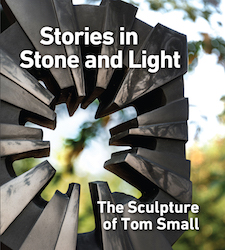
If you frequent the San Juan Islands, you've likely seen Tom Small's sculptures — shaped in stone, but the opposite of ponderous. This Thursday, sponsor Arundel Books is celebrating the launch of a new book celebrating Small's work, on their Chatwin imprint, and you're invited to attend.
The book's focus is expansive, gracious images highlighting the sculptor's work and process; the launch party doubles as the opening for a new exhibition, so it should be a truly immersive experience. Stop by Arundel Books in Pioneer Square this Thursday night from 6 to 8 p.m. to sample the sculpture, meet the artist, and help launch a beautiful new book into the world.
Sponsors like Arundel Books make the Seattle Review of Books possible. Did you know you could sponsor us, as well? Get your stories, or novel, or event in front of our passionate audience. Take a glance at our sponsorship information page for dates and details.
Over at The Smart Set, Paula Marantz Cohen wrote a terrific piece about how one negative book review — written by Norman Mailer — changed the course of a friendship and a career.
If the personal is political, as the ’60s activists used to say, the political is, even more, inherently personal. When a smart, highly sensitive man like [Norman] Podhoretz is dramatically misread by most everyone he respects, when his dearest friend makes a laughing stock of him in print, is it surprising that he would be driven to separate himself socially and politically from everything such people stand for?
Can negative book reviews inspire a person, eventually, to become a horrific apologist for one of the dumbest wars in American history? You'll have to read Cohen's piece to find out.
An interview with our July Poet in Residence, Kelli Russell Agodon
Kelli Russell Agodon was the first poet we published on the Seattle Review of Books, and it was readily apparent that she was the right choice. Not only was her poem a note-perfect benediction for the site — it could be read as a meditation about the distance between storytellers and audience — but Agodon is such a significant figure in the Seattle-area poetry scene that her poem provided the site with instant credibility. Agodon has so many fans — of her poetry, of her publishing company, Two Sylvias Press, of her outspoken politics — and those fans pay close attention to everything she does. Agodon talked with me about all of this and much more. This interview has been lightly edited.
First I wanted to start by thanking you. When we were looking for a poet to kick off the site with that first week, Martin suggested you, and you were, I think, exactly the right poet to launch with, because you are such a terrific member of the community, you have an amazing group of friends and associates who listen to what you say and so really helped lead people to us, and so I just wanted to thank you for that.
Oh, good. That's really good to hear. Thank you. I was honored to be chosen.
I wanted to ask you about that community. You're so active on social media and people really care about what you say. Which is noteworthy because laypeople don't often associate poets with being social. Do you have to work at being social, or are you just naturally a people person?
I am so not a people person. I’m not an extrovert and I don’t like to be at parties. That's why I write — because I'm not so good at talking or socially interacting. People always say they're surprised to hear I'm an introvert, so I tend to be an introvert with extrovert tendencies, maybe.
I always try to just interact with the belief that everyone's just trying their best. It's nice to hear I do it well, because I don't necessarily feel that way.
I think you do, I think people really listen to what you have to say.
Oh, well thank you.
So you're a poet and a publisher. Are those two jobs related? Are you a publisher because you're a poet?
You know, I'm a publisher for a really strange reason. We accidentally started this press, Annette Spaulding-Convy and I. Back in — gosh, maybe 2008? — we were coming from an event in Seattle on the ferry and we had glasses of wine and we started talking about wanting to publish an anthology of women in poetry, but in ebook form.
She had just gotten a Kindle and I had gotten an iPad. At that time, there was no poetry on there — nothing contemporary. The poetry publishers were lagging behind, so we said, "Well, let's just do this and see what happens." We couldn't find anyone that could do an ebook, so we just did it ourselves.
And then another project came along. Jeannine Hall Gailey’s book went out of print, so now that we're a press we put her book back into print. And then, the next thing you know, we had a press.
It's completely different sides of my brain. I always told myself I had to be a poet first and then editor second. This year especially, I’ve had to make some balance changes to put more focus on my writing.
What does putting more focus on your writing look like? Is it just taking the time, or do you behave differently when you're thinking more of the writing?
Yes, I behave very differently. I'm in my head a lot more, running poems through my head, thinking about my manuscript. I see the world very differently when I'm in the space of a poet. But also taking time for like writing residencies. I'm applying for more things and also just reading more, waking up and instead of checking my email, I’ll go outside with a book of poems and start to read. Even if it's a busy day and I can only read three poems, that’s still three poems more than I would have read.
It's being more mindful, I think. Sometimes a job can take away from who you are as a writer. I had to quit a corporate job early on just because I had completely lost my poet self.
What is the story of you and poetry? Is it a love story, or a comedy, or a horror movie?
All of the above. I think in every poet's life you can have scenes like in horror movies. We used to get paper rejections in the mail and, like, the double-team rejection came in.
But I think I'm happiest when I'm writing and when I'm in that creative space. I would say right now it's probably a pretty boring Lifetime drama that nobody's watching. But I hope eventually it turns into something good — maybe an Oscar winner.
I love how you ran with that! So, have you always been a poet or is that something that you realized you can be later on in life?
Well, I've always been a writer, even as a kid. We got to do little electives as a second-grader, and I remember choosing creative writing and I remember [my teacher] liking my story about a purple giraffe, or something like that.
I was always a reader and I was always a writer. Then I went to UW and I was actually focusing on fiction, and then I took a class by Linda Bierds, a poetry class, and completely got turned on to poetry.
Are the poems that we're running on the site this month more recent poems, or are we in the back catalog while you come up with new poems?
No, you're running really recent poems. It was really nice that you were able to choose the ones that you felt worked best for you, because as a poet, probably my worst skill is I'm never sure what poems are the best, or that people respond best to.
I'm always shocked when a poem kinda goes viral or gets shared a lot, it's never the poem I think will take off.
I wanted to ask you about your poem “Downpour.” Martin and Dawn and I decided to run it on the 4th of July because we thought it felt like a political poem. I mean, first of all, running a poem titled “Downpour” on the 4th of July is kind of a statement too. But it feels very political to me. Is that an accurate read of it, you think?
Yeah, definitely. There's been a lot of new poems since November that have that edge or that slant. I think I, like many, just was kind of complacent. I was so active in the Bush years with Poets Against the War, and just ... and then, well, I don't know. A lot of those newer poems do tend to have more of a political or an activist leaning. You know what they say, every poem is political in some way.
As you said, you were active in the Bush years as a poet. Do you feel like there's a difference in the way that writers are responding now than they were during the Bush years?
A little bit differently. I mean, so many people feel under threat these days, so, just the poems that have been being written by so many people are just incredible. When you're writing poetry — just in writing in general — when there is tension in your work, it ups the game. Some amazing works of art have come out in the last, what is it been, in like eight months?
My God, I can’t even think of it…
Yeah, have we only been in this presidency for six months?
What do you think poems can contribute, politically speaking?
Well, they can help other people understand, or heal. I always think of Maggie Smith's "Good Bones." I wrote the little article for you guys about that poem going viral. I think a lot of people go to poetry in times of crisis, even though they may not realize that they're doing it.
I think just adding art anytime is a good thing. I think it's useful to people, When big things happen, and then you read a poem that completely states what you're feeling, even though you didn't know those were the words or the images or the metaphor for it, that’s powerful.
I do think that's why they're shared and why it is important. It does connect us. I go to books and poetry when I'm down.
Do you think of yourself as part of a tradition of Northwestern poetry?
I do. I was born in Seattle and I grew up in Seattle. In my corporate job, I was working in Redmond and then I realized it was killing my soul. So I quit and geographically changed my location to across the water. I ended up in Kingston, Washington, so I was a ferry ride away from my old life.
Yes, I do really feel like a Seattle poet. I mean, it's funny, I still consider myself a Seattle poet even though I don't live in the city. I think because I'm always there. I'm always on that ferry.
I do believe there’s a Seattle Renaissance. There's such a large poetry community that is so strong. I do feel like this is a really good place to be a writer.
Who, locally, do you like these days?
Well, Susan Rich and Martha Silano, and Jeannine Hall Gailey, Elizabeth Austen are definitely four favorites. Erin Malone, too. Jeannine Hall Gailey hasn't written a lot but she's always been one of my favorite poets. Of course Kathleen Flennniken, who is working on a book.
Is there anything about them that makes them Seattle poets, you think? Is there common thread?
Well, Susan, Martha, and Elizabeth and even Kathleen, they all have place. Seattle is all through their poems. If you read their books of poems, Martha's got a poem with Pagliacci Pizza, and you know, Susan Rich has poems on Alki. I feel like we're represented ... And Claudia Castro Luna did that beautiful thing where she was documenting poems in places, did you see that?
The Poetic Grid? Yeah.
Yeah. I love how poems are just woven in into our landscape, it's so Richard Hugo-esque.
It seems like you're pretty prolific, so far as poetry goes. You write a fair amount. Is that a correct assessment, do you think?
That's very correct.
Do you wind up publishing most things that you write or do you —
No. I write a lot, but I would say that 90 percent, 95 percent of my poems never make it out into the world — either because I'm continually revising them, or I decide I don't like them, or they just disappear. I have one Word file that's called "New Work," which has got a bazillion poems in it, and then I have one called "Completed Poems" and a document can move into completed but then I might think it's not completed and move it back.
I'm constantly writing, but I am a terrible submitter. I tell people to submit their work, I wrote a little essay that went viral: "Submit Like a Man," which is something that I noticed when I was working at Crab Creek Review — that we would ask poets to submit, and the majority of men responded within like a month or two months with work, and then women, we sometimes would hear from them six months later and a lot of times you'd never hear from them.
It's funny, 'cause I wrote that article, and I am absolutely terrible at submitting my work. I love to write, I don't like to submit. It's not even the rejections — it's just I get the joy in the writing, not in the publishing. It's always fun to get feedback and to hear what people think — you know, if they like your poem — but it's kind of a pain to submit your work.
Yeah, which to me, that's interesting because I think that it's pretty common for writers to hate to hustle their own works and to promote it, but as publisher, you've gotta hustle other people's work. Is that difficult for you?
It's really easy to hustle and promote other people's work. It's so much easier, because all the books at Two Sylvias Press that we have published and are publishing, we absolutely love. We love our poets and our writers, and we love their work, so it's really easy for us, for me, to share a poem.
It's a thousand times easier for me to contact Oprah Magazine with somebody else's book than for me to ever send my own book there. When you're trying to get somebody else's work into the world, you have no reservations.
But with my own work, I never contact reviewers and say, "Would you like to review my book?" And I don't know if it's a weird self-consciousness where you don't wanna feel like the used car salesman. But sharing my friends' work and poets I love, I do all the time without hesitation.
But it is interesting thinking about just the title of your essay: "Submit Like a Man." I wonder if there's a better system out there. Like, what would successfully submitting like a woman look like, you know? I don't know if there's an answer to that or if it's even a question, but it seems like mimicking mediocre men has not worked out that well for us as a society. I wonder if there's a way to go about it.
I don't know. I mean, I'm a perfect example of how not to submit. I have a 16-, almost 17-year-old daughter who doesn't seem to have a problem asking if she needs something, or for what she wants.
But I was a kid of the 70s, and I always knew that when if I came home and complained, "So-and-so was mean to me," the first question [from parents] was, "what did you do?" Like, "what did you do to cause that?" So, it always came back to: the problem is with yourself, as opposed to, you know, "hey, that guy's just a jerk."
I do think it's changing. The young women in my daughter's class, they're all go-getters and they're much more aware. In that respect, the internet has been excellent in helping young women see their worth.
The Sunday Post for July 30, 2017
Each week, the Sunday Post highlights a few articles good for slow consumption over a cup of coffee (or tea, if that's your pleasure). Settle in for a while; we saved you a seat. You can also look through the archives.
I choose my pearls: on feminism, fashion, and Disneyland
A microinteraction with a stranger waiting to ride the Big Thunder Mountain Railroad sparks a wide-ranging essay by Tabitha Blankenbiller on women’s clothing, choice, and self-respect. And nope, it wasn’t a man who shamed her for wearing a dress to the Happiest Place on Earth.
A day at Disneyland is a rare day of freedom. If you have a ticket, you have the world. You can stay as late as your feet will carry you, ride as many Mountains and Mansions and Cruises and Carousels as you wish. You can have Dole Whips for lunch and Matterhorn Macaroons for dinner. You can let yourself believe that the college student in a wig you’ve waited forty minutes in line to be photographed with is actually Cinderella because she is Meryl Streep-level committed to the role. A hundred fireworks end the day not because it’s special, but because it exists.
On top of that, you can wear whatever you want.
I've Found Her
You’ll begin this piece by Martha Baille knowing what it’s about; very shortly in, you’ll realize you have no idea at all. But you’ll keep reading — lyrical in substance, blunt in language, and personal without a hint of gossip, it’s addictive. Yes, this is slightly mysterious; now is a moment for trust. Read on!
My future self, month in month out, has perched on the tall filing cabinet in the corner of my study these past eleven years. Every so often I’ve cast a glance her way, applauded V for his fine sense of humour, and wondered about the life and identity of the woman captured in the likeness offered to me as a teasing foretelling of who I may one day become. Most days I’ve given her no thought, yet she has hovered. Then H’s recent shot of her arrived.
What It Feels Like Being A Trans Person Serving In The Armed Forces
Graphic novelist Jess Ruliffson has spent the past five years interviewing veterans of the Iraq and Afghanistan Wars for an upcoming book about their experiences. This well-timed excerpt is a reminder, for those who need it, of what’s at stake when our crazy president salves his political humiliations by reverting to Bully in Chief.
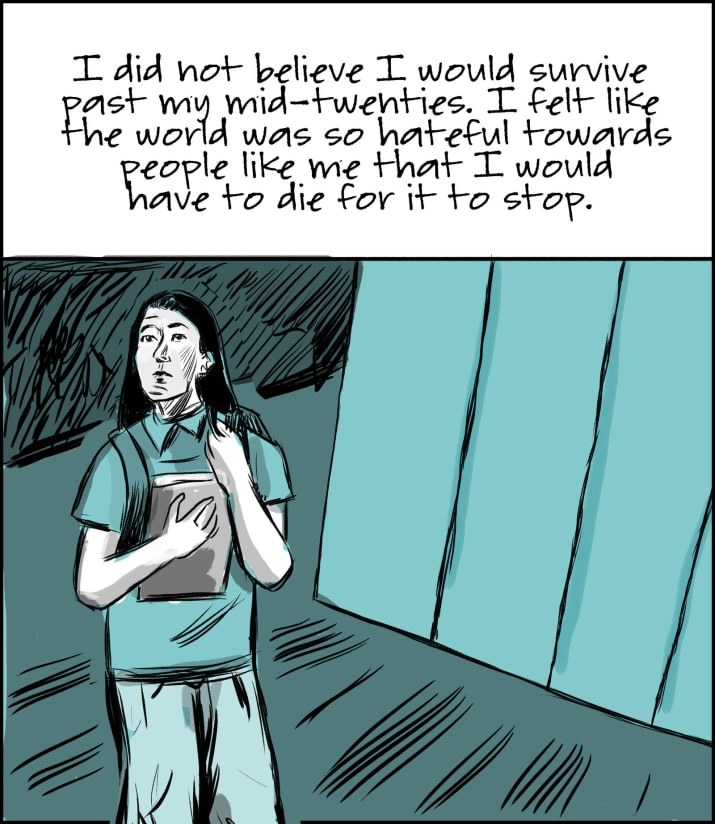
If Hillary Clinton Had Won
Nate Silver wins this week’s sci-fi smartass award for playing tour guide through an alternate universe in which we were all right about Election Day 2016.
Things are really different on Earth 2! Merrick Garland is on the Supreme Court instead of Neil Gorsuch. Clinton didn’t enact a “travel ban.” The United States didn’t withdraw from the Paris climate accord. Kellyanne Conway has a CNN show.
OK, maybe things aren’t that different. This is Earth 2, not Earth 5, where Clinton won in a landslide, or Earth 4044, where Jim Gilmore is president (it’s a cold and dark place, and I wouldn’t advise visiting). Earth 2 preserves about as many of Earth 1’s features as possible, other than the things that just can’t be the same because you have Trump as your president and we have Clinton as ours.
A New Approach to Designing Smart Cities
Would you rather live and work in a Twinkie, or in your grandmother’s fruitcake? (Perhaps neither.) David Galbraith proposes a new concept, “recipe-based” city design, that could change how architecture and city planning interact with human experience. A fabulous set of images and examples, from David Cronenberg to Mies van der Rohe, brings this somewhat wonky piece to life.
This functional need for highly ordered city plans is changing, however, as information technology allows communication that is independent of the physical environment, and intelligent automation allows point to point physical movement in self directed pods rather than mass transit on fixed arteries. Specifically, ubiquitous, GPS enabled smartphones remove entirely the concept of "getting lost," and route programmed self driving cars and mesh network power grids enable organic city layouts to replace grids. Cities of the industrial age looked mechanical, cities of the information age can look like fractal networks — like nature.
Seattle Writing Prompts: The Battery Street Tunnel
Seattle Writing Prompts are intended to spark ideas for your writing, based on locations and stories of Seattle. Write something inspired by a prompt? Send it to us! We're looking to publish writing sparked by prompts.
Also, how are we doing? Are writing prompts useful to you? Could we be doing better? Reach out if you have ideas or feedback. We'd love to hear.
We interrupt this Writing Prompts to call your attention to:
We're running a short story contest based on Seattle Writing Prompts, judged by Matt Ruff! Come and join the party, we can't wait to read your stories.
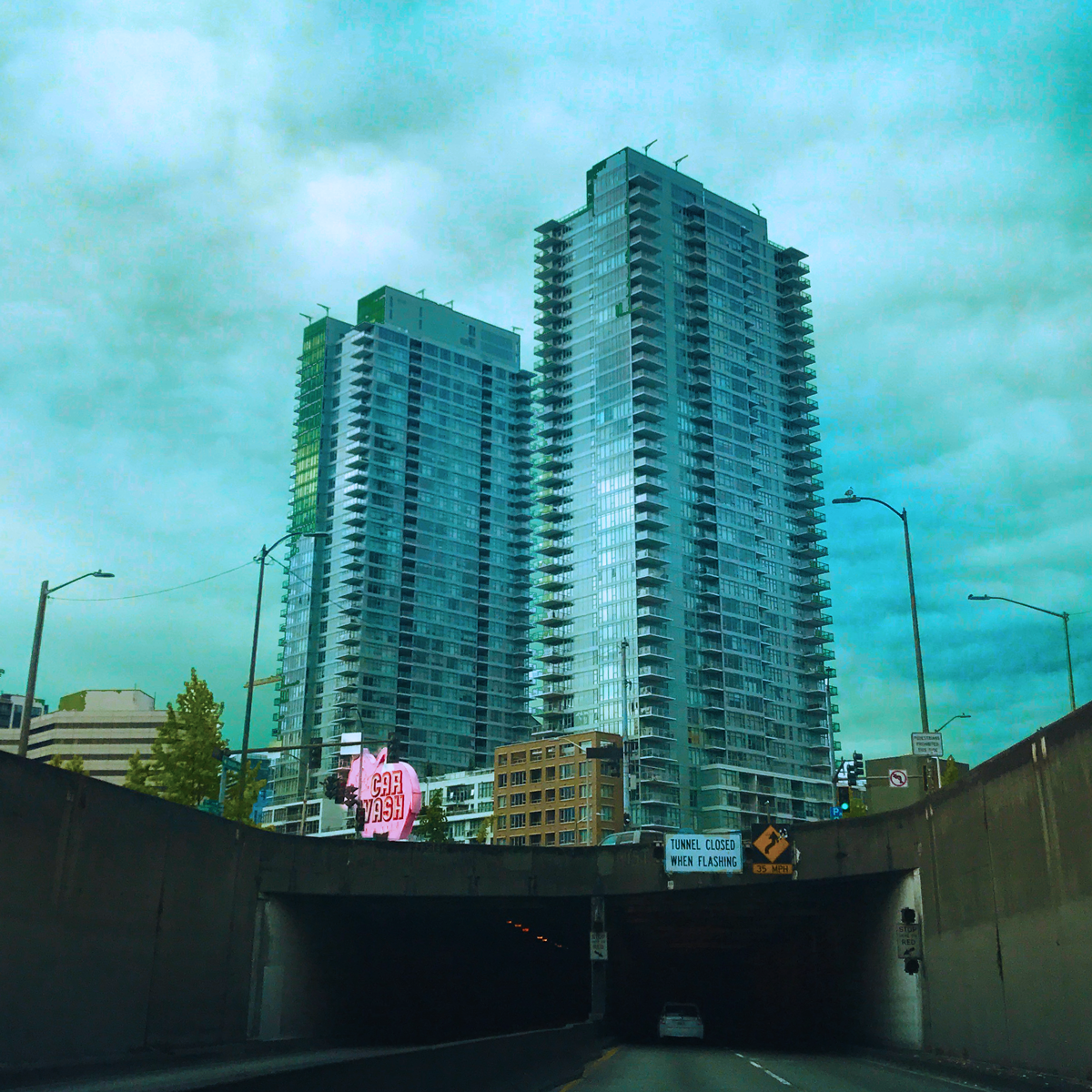
It's the tire tracks on the yellow walls that always get me. How often do cars go through that tunnel at such speed that their wheels end up on the walls? How often do they scrub or paint them?
The tunnel, built in 1952 and not upgraded since, runs under Battery Street (betcha couldn't guess that), which explains those passive ventilation grates that run down Battery Street. It's set to be dismantled and filled when the Alaskan Way Viaduct replacement tunnel opens in early 2019.
The word "battery" has always confused me. The most popular common usage, of course, refers to a device to store energy (if you have a Tesla, you can drive your battery under Battery Street, at least for a while longer), but it also means assault (or, battering), which strikes me as the opposite of containing energy.
When you sing along to " ... the Bronx is up and the Battery's down, the people ride in a hole in the ground ... " while watching Kelly, Sinatra, and Munshin high-kick their way through the naval yards in On the Town, they're referring to the park at the tip of Manhattan, named for the battery of artillery installed to defend the settlement in the early days of the island.
The OED, in fact, lists seventeen different meanings of the word, some specific to industry, such as mining or cooking. Of these, it's hard to know how Battery Street got its name. Well, hard for me to research in the time-boxing I allow myself for these columns. Do you know? Perhaps a letter to the editor is in order?
For our purposes today, let's just stay tight on the tunnel. Yes, that means I can't spend time going over Battery Street's important part in film distribution history in Seattle, but people, we're here to talk of the tunnel, not that which lies above.
So, let's do just that. I mean, what could possibly happen in a tunnel?
Today's prompts
Yes, it's my fault the spell went wrong. I created this effect, that for a brief period between 6:12 and 6:45 p.m. on Tuesday night, every car entering the Battery Street Tunnel southbound, whose driver thought of someplace else in the world they wanted to be, was instantly transported to that very place. It was my boyfriend I was trying to target. What wasn't expected was that his car would materialize with him and smash the front of my house, breaking the circle that contained my spell, along with my concentration, and expanding the scope of the magical energy. Anyway, I'm sorry about that, all you people who were suddenly in your favorite, or least favorite, place. I'm sorry to those of you who were catapulted back to work when you were almost home, or sent to your aunt's smelly living room. That sucked. Now let me tell you how I tracked everybody down and returned them home, and how I'm gonna use my powers to make it right.
I was few miles into tailing the Dodge Dart when we entered the Battery Street Tunnel. The deal had gone down up Aurora, and I could have pulled them over any time, but I had a hunch they were gonna lead me to the big guy, finally. I kept a few cars back as they entered the tunnel, staying in the right lane in case they took that Battery Street exit that would drop them off at Western. But then, the damnedest thing. I look down at my speed, and glance back up, and they're gone. And so is the VW I was following. And about half the other cars in the tunnel. Into thin air. I pulled off the highway myself and picked up my radio, but didn't even know what I could say to dispatch.
Going through the tunnel was the hardest thing I ever had to do. It was like rewinding time and going back to the night it happened. Exposure therapy, said a friend. Gotta get on that horse. I got offers to drive me through. But I can't even get in a car now with someone else behind the wheel. I need control, as much as possible. I need to feel it. Tonight is pilgrimage. I pay homage to where it happened. Tonight I mark the moment my life changed in such dramatic ways.
How many animals do you think have gone through the Battery Street Tunnel? How many wolves? How many horses? How many dogs in crates, or cats in carriers, or parakeets in cages on the way to the vet? How many baby alligators or bats in boxes or or mice in the lining of a car? There's one animal I can tell you about for sure, but you're not gonna believe it until I show you the pictures. I'm gonna tell you about the sloth that went through the Battery Street Tunnel, and I'm gonna tell you about how it wasn't in the back of a car when it did it.
The argument heated up right as they approached the tunnel. "Oh, he's alright," he said.
"No, he's not," she said. "He hit her."
"Yeah, but like, under it he's a good guy. He just made a mistake," he said.
"Yeah, he made the mistake of assaulting another human being. Why are you giving him a pass?" she said.
"I'm not!" he said. "He needs to deal with it, obviously. But I'm just saying he's not all bad, he's just a troubled guy who did a thing he shouldn't have."
"Can you imagine me saying this about her if she, like, cut his dick off?" she said.
"Whoa, whoa. He didn't cut off a part of her body," he said.
"Yeah, but I'm exaggerating because you're not taking this seriously," she said.
"Of course I'm taking this seriously!" he said. "I agreed, they should call the cops. She should call the cops."
"Yeah but you didn't agree for a long time," she said.
"But I did agree," he said. "I agreed and I helped call ... "
She interrupted him. "I just wish we could go back and see it so that you could see how scary it is to be her in that moment. I just wish we were there right now."
No, Donald Trump didn't kill fiction. He just knocked it out for a little while.
Earlier this week, Morgan Jerkins published a report at the New Republic about a slump in book sales following the election of 2016.
Trump’s Presidential win has sent a rippling effect through the book publishing world, affecting authors, booksellers, editors, agents, and publicists: In a world where reality has become stranger than fiction, actual books are no longer selling.
I wrote a post last month titled "Is It Just Me or Has 2017 Been a Bad Year for Novels?" I wondered in that post if the "politically difficult times" were interfering with my reading life.
Jerkins's piece confirms that suspicion. The times are so weird, so fraught, so exhausting, that many of us don't have the brain-space for fiction. Don't worry: I'm not about to launch into some maudlin "Fiction Is Dead" piece. We will always need novels.
The truth is, we've been here before. I can remember two other times in my life when novels held no appeal for me: after 9/11 and during the 2008 election cycle. Both times, the fate of the nation was tenuous. Both times, we stood on the edge of a systemic collapse. And here we are again.
Here's what I think will happen, in the weeks and months ahead. I don't think the Trump administration is going to get any more normal. I don't think we're going to adjust to this new world. But I do think fiction is going to grow and change and absorb our reality, and it's going to become relevant again.
In the days after 9/11, reading the glossy suburban-angst novels that were choking bookshelves at the time was a wholly unsatisfying experience. Likewise, when the global financial markets choked and died in 2008, bookstores were crammed full of novels parodying the cheesy glitz and glamor of economic boom times. Entire bookshelves full of titles hit their expiration date overnight.
And then fiction adapted.
After 9/11, American novels turned outward and addressed the world again. After the economic collapse, novels dropped their flippancy and embraced difficult questions about what it means to be an American. Novels change with the times; that's what they do. You don't get an Americanah, for instance, without 9/11 and the election of Barack Obama and Occupy Wall Street.
I don't know what the next, more relevant wave of fiction will look like. I suspect not a lot of it will mention President Trump by name, even though it will be immediately recognizeable as post-Trump fiction.
I suspect we're going to see fewer dystopian stories, now that the question of what can possibly go wrong has been answered. I hope the next wave of fiction is funny. I hope it's imaginative and incisive and not at all self-serious. I hope less of it is written by earnest young men who live in Brooklyn.
Fiction takes time. It has to stew for a while before even the first draft can be written. But I know that there are novels out there just dying to explode into bookstores, and I can't wait to read them.
From UBS bookseller Caitlin:
Weekend plans? Come visit us @ubookstorereads all books are 25% off in store and online! 📚📚📚📚📚📚📚📚 pic.twitter.com/QMOLSJBRyM
— Caitlin Luce Baker (@Cait_onthe_Luce) July 28, 2017
This is as good an invitation as you're gonna get to stock up for the long summer weekends ahead.
The Help Desk: The shelves of desire
Cienna Madrid is on vacation this week. Since this week is the second anniversary of the Seattle Review of Books, we're re-publishing her very first Help Desk column from the site's launch week in 2015. As always, you can send your own literary etiquette questions to advice@seattlereviewofbooks.com.
Dear Cienna,
My boyfriend and I are moving in together next week. I'm very excited about this, and I'm confident it's the right move. But we just had our first fight over a moving issue, and it's something I feel very strongly about: he wants to merge our book collections together. I want to keep our shelves separate. It's not that I fear intimacy; I'm 95 percent sure we're going to get married one day, and I'm very happy with him. But I'm not sure I ever want our books to mingle. Is a lifetime of bookshelf non-monogamy too much to demand?
Judy from Ballard
Dear Judy,
I have never lived with a man — not because I refuse to blend my bookshelf, for far more broken reasons — so feel free to take my advice with the same side-eyed respect you’d give a porn star in sweatpants. As I see it, how you arrange your book collection is a sacred thing. For instance, my books are arranged on three shelves: The top is all-time favorites no one is allowed to touch; the second is books I have never read, arranged in the order I aspire to read them; the third is books I have stolen from other people, mostly for petty reasons.
If a MAN came into my space, swinging his DICK around and inserting copies of How to Win Friends and Influence People and Atlas Shrugged and Hemp: A History all willy nilly — trigger warning — my shelves and I would feel a little violated.
Explain this to your boyfriend. If he still does not understand the importance of separate bookshelves, I suggest you get a cat. Name it Cienna. Then, whenever you and your boyfriend have a domestic dispute, wait until he sleeps. Take one of his books off the shelf. Piss on it. Blame it on Cienna. This will provide you with a physical way to vent your spleen after a fight (full disclosure: I don’t know physics) while slowly weeding your bookshelf of his books.
You’re welcome,
Cienna
Portrait Gallery: Inara Verzemnieks
Each week, Christine Larsen creates a portrait of a new author for us. Have any favorites you’d love to see immortalized? Let us know
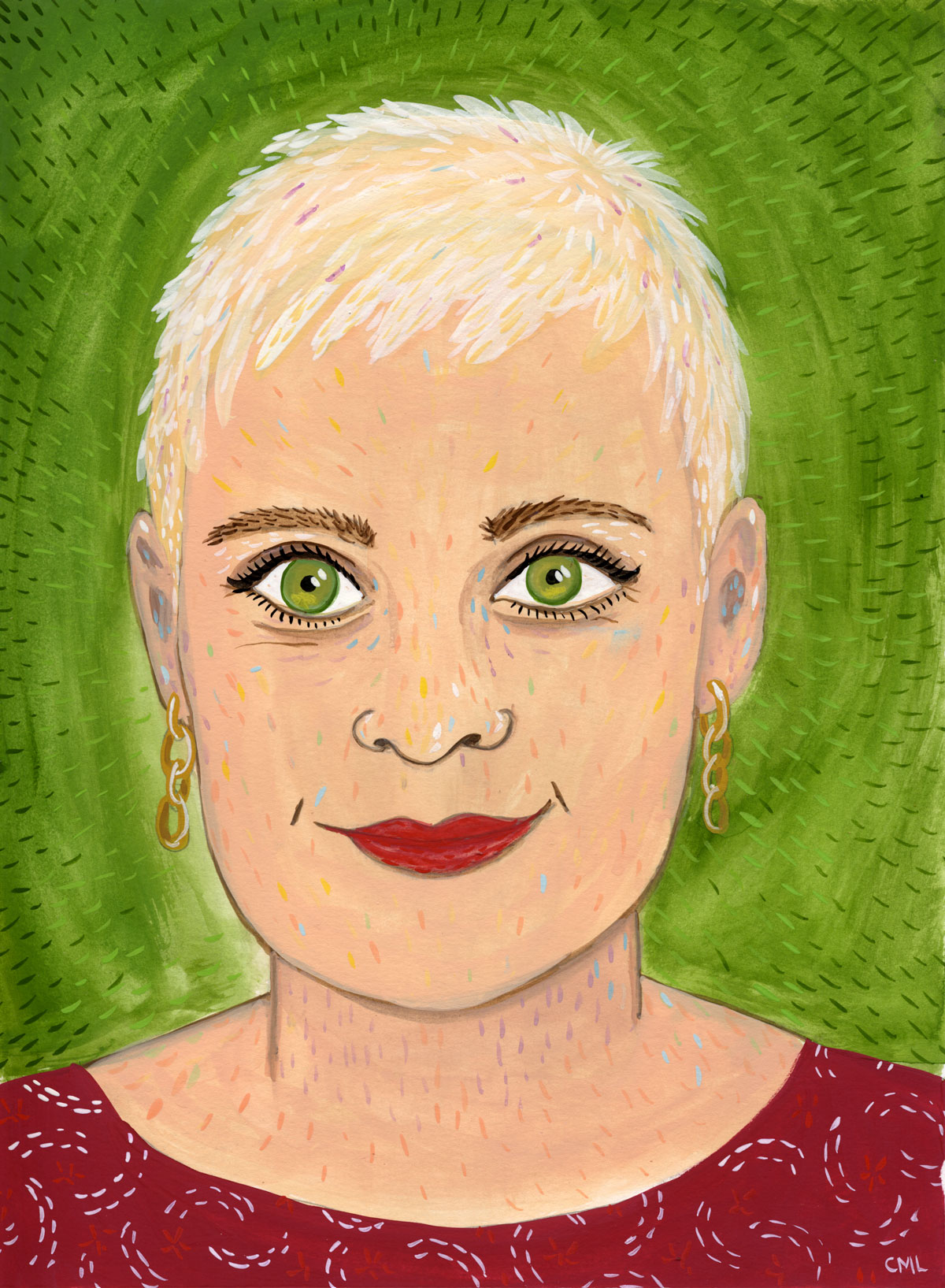
Thursday July 27th: Among the Living and the Dead Reading
University of Iowa creative nonfiction writer Inara Verzemnieks reads from her new family history, Among the Living and the Dead: A Tale of Exile and Homecoming on the War Roads of Europe. It’s a story of how her family traveled from Latvia to Washington state, where she was raised.Seattle Public Library, 1000 4th Ave., 386-4636, http://spl.org. Free. All ages. 7 p.m.
Criminal Fiction: leaving out the parts that the readers skip
Every month, Daneet Steffens uncovers the latest goings on in mystery, suspense, and crime fiction. See previous columns on the Criminal Fiction archive page
A gleeful moment catching a fictional private investigator in the act of comfort-reading an Elmore Leonard novel had me rushing off to re-visit this fun guide to writing. From "Never open a book with weather," all the way to "Try to leave out the part that readers tend to skip," and with a loving nod to the power of hooptedoodle, Leonard’s teasing, detailed advice is pure pleasure.
Reading around: new titles on the crime fiction scene
A car crash has crippled Jane Norton with severe amnesia and left her passenger, David Hall, very much dead in Blame by Jeff Abbott (Grand Central). A note, found on the scene, indicated a suicide attempt on Jane’s part that apparently went horribly wrong. As the book opens, on the second anniversary of the crash, a new note turns up and Abbott’s perfectly-paced thriller catches literary fire, crackling along with a nicely-meshed Jason Bourne-I Know What You Did Last Summer vibe. With Jane’s memory full of gaping holes — she remembers her favorite books, from A Wrinkle in Time to the magical reads of Edward Eager and Lloyd Alexander, but blanks on the accident — we’ve got a literal unreliable narrator on our hands. Abbott, a deft and nimble writer, skillfully steers us through small-community pettinesses and pressures, as well as, yes, the dark evil that lurks — all too often, it seems — deep in suburban territory.
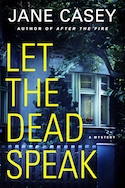
London detective Maeve Kerrigan is back on the case in Let the Dead Speak by Jane Casey (Minotaur). A claustrophobically-short street provides the immersive setting for a bloody crime scene: there’s a profusion of blood, in fact, but the killer appears to have absconded with the corpse. Kerrigan and her team, including fresh meat Georgia Shaw who can’t quite land on Kerrigan’s good side, tangle with a sullen young man with a history of violence, two vulnerable teenage girls, and a family of evangelicals that includes a couple of brothers with some serious sibling rivalry issues. Kerrigan’s ability to home in on people’s deepest, most destructive qualities as well as their inevitable Achilles’ heels — “her trick of understanding more than she should,” as one character notes – keeps the tension level high. Kerrigan and her colleagues’ ability to banter about things like, say, the stability of eyeball fluid when it comes to sampling for the presence of drugs, keeps everything else grounded in grisly police procedural reality.
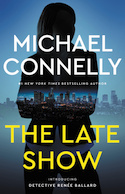
Michael Connelly adds the excellent Detective Renée Ballard to his stable of engaging protagonists in The Late Show (Little, Brown), and, thanks to Connelly’s concise and empathetic writing, Ballard arrives fully-formed, with a heady sense of familiarity about her. Ballard, recently relegated to the night shift (“the late show”) due to illicit politicking by another officer, chases up a credit card robbery, a near-fatal beating, and a “four on the floor” nightclub shooting, which all kick off over a busy night’s work and then overshadow her sleep-deprived days. In between her investigations, she tries to chill out with her paddleboard – there are canny surfing and journalism elements to her backstory – her loyal pooch and her loving grandmother, but much of the book’s blistering action is based around Ballard pursuing the baddies while fighting off some nasty colleagues who have it in for her. Detective Ballard is off to a winning start: she may be short of sleep, but she’s already a legend.
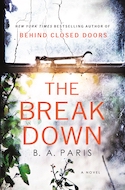
In The Breakdown by B.A. Paris (St. Martin’s), Cass’s apparent dream of a life deteriorates quite quickly when she notices a woman in a car on a lonely stretch of road, and then that woman turns up murdered. Cass has a wonderful husband, a fiercely loyal best friend and a supportive group of colleagues, but the unexpected death plays on her mind and her emotions. Exacerbating an already stressful situation is the fact that her mother died from early-onset dementia and — a fumbled BBQ date here, a slip of memory around a gift there — Cass quickly becomes convinced that she’s suffering from the same familial memory issues. Behind Closed Doors, Paris’s 2016 psychological thriller debut, was one of the more terrifying reads of the year; this follow-up isn’t quite as edgy, but it’s highly engaging nonetheless.
The Quintessential Interview: Bill Loehfelm
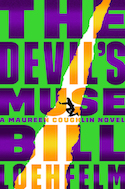
Bill Loehfelm’s New Orleans police officer, Maureen Coughlin, like Loehfelm himself, relocated from Staten Island to The Big Easy where she’s already gappled with high-level corruption as well as more general criminal activities. In The Devil’s Muse, out this month from Farrar, Straus and Giroux, and taking place over the course of a single, tension-tattered night bang-smack in the middle of NOLA’s Mardi Gras festivities, Coughlin has her patience tested by a documentary filmmaker, a nasty new street drug, a neighborhood shooting, and some of her more surly colleagues. Excellent stuff.
What or who are your top five writing inspirations?
I get a lot of inspiration from movies, actually. Both old favorites and something new that really kicks my ass, especially if it has killer dialog.
Songwriters, too. Someone like Jason Isbell, who I’ve been big into lately, can get a whole novel into a four-minute song. That amazes me. When I hear it done well, it makes me want to get to work. Every time I see my friend Kelcy Mae play music, songs that she wrote, I want to go home and write.
My wife, AC, is a great writer and an indefatigable worker. I always want to make sure I’m pulling my weight around the house.
Seeing other artists at the top of their game is always a challenge and inspiration.
And two weird stories I grew up with – Batman and King Kong. Something about those two stories, those two American myths, it’s like there’s something mystical I’m always trying to pull out of them.
Top five places to write?
The last few books I’ve written exclusively at home since I work on a desktop. We have a sunroom at the back of the apartment that works great as an office: it’s almost all windows, and we call it “the lighthouse.”
I take my editing on the road, though. I live in a coffee shop rich neighborhood and I can walk to a handful. My favorite is the Rue de la Course on Magazine Street, which, after a few misguided years as a restaurant, is a coffee shop again.
I like Mojo on the corner of Magazine and Race, too – which many years ago was the original Rue. There’s a cool place on Magazine called the Reservoir, but that’s more of a crepe place now.
Every now and then I hit HiVolt, but like a lot of the new school coffee shops, they close early.
Top five favorite authors?
Picking only five is impossible. Kate Atkinson is the first one that comes to mind. She’s a stone genius. Megan Abbott has done some of the best work of the last ten years that I’ve come across.
Donna Tartt is in a class by herself.
And JK Rowling has to be in there, too. I love her books as Robert Galbraith as well as that other thing she did. I’ll read anything she writes.
And Alice Sebold, too, who I always forget to mention when I make these lists. I’ve worked real hard to imitate her voice over the years. There’s just an edge that she has. I hope to God she writes another book.
Top five tunes to write to?
For the Maureen Coughlin books I lean a lot on local stuff: A small sample:
- “Criminal” — The Revivalists (I write to a lot of their material)
- “Ice Age” — Dr. John
- “Night People” — the Soul Rebels Brass Band
- “The Corner” — Galactic w/Gift of Gab
- “Power” — Juvenile (w/Rick Ross).
Top five hometown spots?
My screened-in porch.
Joey K’s, a restaurant in the neighborhood where we can get an outside table on the corner. I have lunch there almost every Tuesday with friends who are also self-employed artists.
Tipitina’s for live music any time of year.
The Fair Grounds, where they have Jazz Fest every spring – my high, holy season.
Audubon Park, especially the Tree of Life where I married my wife.